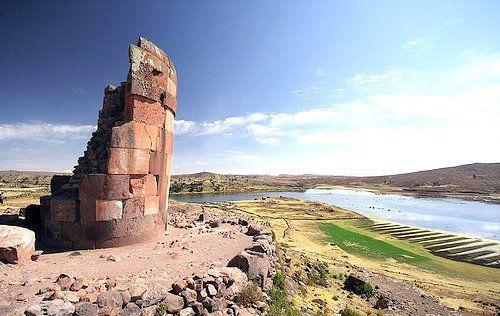Puno, Puno, Peru
Suggest Place to Visit
612
Track to location with GPS |
 |
It is made up of two plateaus that emerge on the Cutimbo and Viluyo pampas, at an altitude of 4,023 meters above sea level, characterized by the presence of Chullpas at the top.
The word Cutimbo comes from the toponymic "qutimpo" derived from the root "qut" which means to return, "impuy", equivalent in Quechua or Aymara of "vuélvete", "return you, right here".
Archaeological evidence shows an occupation prior to the Inka. The existence of Cave Paintings dates back 8000 years, to the late Intermediate (1100-1450 AD) and Inka (1450-1532 AD)). This implies that Cutimbo had a prolonged occupation due to its strategic geographic location, its area of influence, and its ceremonial, ritual, and religious use.
At km 17 of the Puno-Moquegua highway, approximately south of Puno (20 minutes by car), you will reach the detour that leads to the complex.
Hours (all year)
Monday to Sunday from 8:00 a.m. to 5:00 p.m.
Price of admission
General: S / 3.00 nuevos soles / Reduced: S / 1.00 nuevo sol / School: S / 0.50 cents of sun.
Chullpas or Pucullos:
These funerary buildings are scattered throughout the plateau. They are circular, square and rectangular and of different dimensions. The minor ones are of rustic manufacture, with semi-edged stone and clay mortar. Its upper part has a cornice and its interior the "Advance Vault" or "False Vault". The door is trapezoidal in shape, generally facing east, where the sun rises. The construction technology of the large buildings is based on polygonal basalt stone masonry, with zoomorphic representations in high relief (feline, vizcacha, monkeys, snakes).
It was the work of the Qolla, Lupacas and Inkas. The existence of these structures is explained by the deep-rooted cult of the dead and the belief in immortality, "they passed to a better life." Important personages (Caciques), such as the Malkus or lords, were buried, even sacrificing their women and servants to accompany and serve him in the afterlife; That is why they were mummified and dressed in their best suits, wrapped with fabrics and strings of ichu and reeds, associated with funerary equipment.
Ushno or Temple:
Located in the central part of the plateau, it presents a monumental and peculiar architecture of the ceremonial type. Built with volcanic rock, andesite (volcanic tuff) and using two stone colors, one lighter than the other. It is square in morphology, with a height of just over eight meters by almost seven meters at the base.
In its interior towards the west, there are three niches or niches; to the north and south, two niches; in the upper part, two corbels on each side where the funeral bundles would have been placed for ritual purposes for the rulers and priests. The upper external part presents decoration of serpents in high relief.
In the excavations an "Altar of Cremation" has been discovered with charred bones of humans, camelids, birds, ceramics.
Comments
We don´t have yet any comments about:
Cutimbo Archaeological Complex
Cutimbo Archaeological Complex
Be the first to leave a comment as it is very important to inform other people
Outros locais a visitar
Within a radius of 20 km from:Cutimbo Archaeological Complex
Unfortunately we do not have information on other places to visit in this area yet
Hotel reservation near Cutimbo Archaeological Complex within a radius of 20 km
Why to book with TOURISTIC ROUTES
The best prices
Our partnerships with the world´s largest operators offer research on the best market prices.
More options
At Rotas Turisticos you can book the hotel, buy the air ticket, book the transfer from the airport to the hotel and vice versa, book the local excursions, rent the car, take travel insurance and consult the places to visit and where to go.
Holiday Tips & Destinations
Hundreds of holiday destinations with all the options that allow you to easily choose the destination that best suits your dream vacation.
TOURISTIC ROUTES
Links






